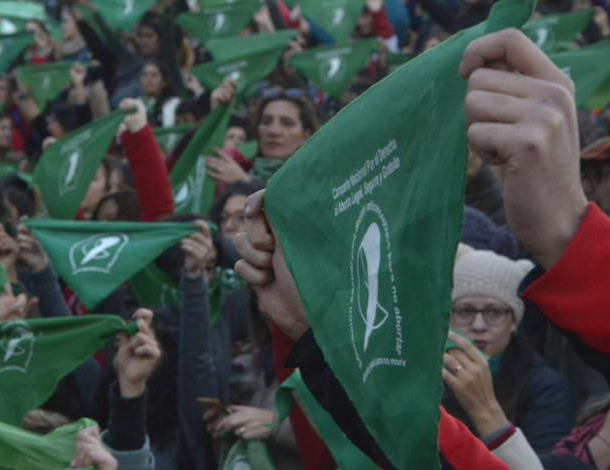On July 9th, Independence Day in Argentina, teachers and parishioners from a school in the Santiago del Estero province sent a “militia” of 300 children donning light blue scarves to march in the military parade. Anti-abortion groups made the scarves to counter the green handkerchief, claiming to be in favour of saving ‘both lives’—the mother’s and the unborn child’s [sic].

After the June 14th vote, when the House of Representatives approved the bill legalizing the Voluntary Interruption of Pregnancies (IVE, in Spanish), various groups and institutions—especially fundamentalist Catholics—ramped up their opposition. Their arguments, sometimes bordering on science fiction, had not served their cause; their marches to “Save both lives” were ineffectual. Out of arguments, they began resorting to violence.
Here are but a few examples, more of which are making national news every day: teachers fired for promoting conversations on abortion (link in Spanish) among students; teenagers visibly wearing the green scarf violently attacked on the street; doctors and clinics threatening to refuse service provision to women seeking information or medical attention; the doctors providing the few already de-criminalized abortion procedures in line with the current national protocol, denounced.
Physical, institutional, and symbolic violence is being deployed to attack and attempt to break up one of the biggest and most coalitioned feminist mobilization seen in Argentina in decades: women’s groups, feminist activists, and new leaders, such as trans men, have joined forces to push for legislation to make the health system more fair and advanced in guaranteeing reproductive rights.
Frustrated by the IVE legislation’s victory in the House of Representatives, Catholic activists appeared to be following Pope Francis’ call to action at the 2013 World Youth Day gathering.
The Pope said, “What do I hope will come out of Youth Day? I want you to make a mess in your diocese, I want you to go out, I want the Church to take to the streets, I want us to defend ourselves from earthliness, from complacency, from clericalism, from only thinking of ourselves…” This call has resulted in the physical, institutional, and symbolic violence mentioned above.
But the Lord’s heavens are not always blue, flooded as they are by a rising green tide: the autonomous collective Cristianas y cristianos por la vida plena y el derecho a decidir (link in Spanish) [Christians for Full Life and the Right to Choose] joined activities supporting the IVE bill, and drafted a document clarifying that “there are no ‘biblical or theological’ reasons for criminalizing abortion or condemning women to carry undesired pregnancies.”
Feminist mobilization continues in front of the Senate, while fundamentalists also continue to march. Each is counting down to the Senate vote, scheduled for August 8th. We know the Senate is a hard nut to crack, with fewer progressive politicians.
Whatever the outcome, it is important to recognize that the mobilization and coalitions forged between feminists, women’s groups, trans activists, and a diverse spectrum of society have proven their ability to advance ideas and legislation. There is no turning back on the abortion debate. And the anti-rights groups know it. They also know that approval of the IVE bill could become the epicentre of a tidal wave of rights across the region.
In many Latin American and Caribbean countries where abortion is completely illegal, such as Nicaragua or El Salvador, or others where it is illegal but for some exceptions, such as Bolivia, Brazil, Chile, Colombia, Costa Rica, Ecuador, Honduras, Paraguay, Dominican Republic, Peru or Venezuela, feminist and women’s movements are watching closely and drawing inspiration from the Argentine process.
Beyond the region we also find a number of inspiring processes.
Who would have thought that a referendum on abortion would triumph in Ireland? This happened because so many people changed their attitude toward abortion thanks to efforts carried out by feminists and invited specialists to educate the public on what it is and why this kind of law is needed. In Argentina, this 20-year process is now culminating; the green wave has reached its peak.
Both Argentina and its other counterparts in the region deserve a Law on the Voluntary Interruption of Pregnancies. It is a public health issue : We have to keep pregnant people from dying, we have to debunk the handbook arguments that fundamentalist Catholics and Evangelicals mindlessly repeat. They are not attacking this law or other advances in rights to protect the family, or the right to life, or even the rights of the unborn child [sic]. They attack to maintain control over our bodies and our desires.
This is about freedom. To live, to choose freely.
Which is what they appear to completely misunderstand. Patriarchy will not fall on its own: we must tear it down with our feminist force. The green tide in Argentina is on the rise, challenging the fear of god.
This article was originally published on Rosario12
